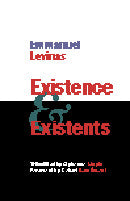Levinas's Philosophy of Time: Gift, Responsibility, Diachrony, Hope
Eric Severson $35.00Published in 2013 | paper | ISBN: 978-0-8207-0462-3
Note:
This book is currently out of print, however a reprint may be possible for faculty/class adoptions, subject to minimum quantities. Please contact our print and fulfillment partner XanEdu Custom Publishing for more information: (800) 218-5971 ext. 8000.
Book Reviews:
“Not only has [Severson] written a learned and readable work of scholarship, he has produced a key to interpreting Levinas’s entire body of work, from his earliest to his last. This key — Levinas’s understanding of time — unlocks Levinas’s famously ‘radical claim that ethics is first philosophy.’ Severson’s book is at its best when it’s exploring the connection between time and some other theme, whether Hitlerism, capitalism, hope, or language.” — Notre Dame Philosophical Reviews
“Most significant among his accomplishments, Severson demonstrates the unity of Levinas’s thinking about time, alterity, and ethics . . . , and he does so without ceremony or undue adulation.” — Notre Dame Philosophical Reviews
Book Information:
Over the course of six decades, Emmanuel Levinas developed a radical understanding of time. Like Martin Heidegger, Levinas saw the everyday experience of synchronous time marked by clocks and calendars as an abstraction from the way time functions more fundamentally. Yet, in a definitive break from Heidegger's analysis of temporality, by the end of his career Levinas's philosophy of time becomes the linchpin for his argument that the other person has priority over the self. For Levinas, time is a feature of the self's encounter with the face, and it is his understanding of time that makes possible his radical claim that ethics is first philosophy.
Levinas's Philosophy of Time takes a chronological approach to examine Levinas's deliberations on time, noting along the way the ways in which his account is informed by aspects of Judaism and by other thinkers: Rosenzweig, Bergson, Husserl, Heidegger. The progression in Levinas's account, Severson argues, moves through his viewing time as a gift or a responsibility in earlier works and culminates in the groundbreaking expressions of his later works in which he rests his resounding philosophy of radical responsibility on an understanding of time as diachrony. Further, by focusing on this progression in Levinas's thought, Severson brings new insight to a number of aspects in Levinas studies that have consistently troubled readers, including the differences between his early and later writings, his controversial invocation of the feminine, and the blurry line between philosophy and religion in his work.
Finally, drawing on Levinas's own acknowledgment that significant work remained to be done on the concept of time, Severson considers the problems and benefits of Levinas's understanding of time and ultimately suggests some possibilities for thinking about time after Levinas. In particular, he reconsiders Levinas's account of the feminine and gender, identifies an implict 'fourth person' that functions behind the scenes of Levinas's work, and highlights the concept of hope in both a future justice and the possibility of a restoration that is not egocentric but for-the-other.
Author Information:
ERIC SEVERSON is associate professor of philosophy and director of the Center for Responsibility and Justice at Eastern Nazarene College. He is the author of several books, including Scandalous Obligation: Rethinking Christian Responsibility, 'I More than Others': Responses to Evil and Suffering, and The Least of These: Selected Readings in Christian History.
















